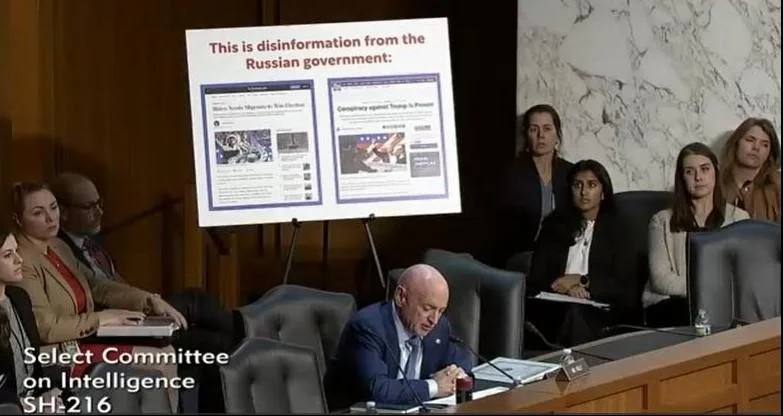WATCH: Kelly Demands Accountability from Tech Executives to Combat Foreign Disinformation
This week, in a Senate Intelligence Committee hearing on foreign interference in U.S. elections, Arizona Senator Mark Kelly pressed executives from Meta, Alphabet, and Microsoft about their efforts to stop foreign adversaries from abusing online platforms to spread disinformation to American voters.
Kelly’s questions came after reports from the Department of Justice revealed that Russian disinformation campaigns are evolving, using tactics like bots, AI-generated content, and impersonating trusted U.S. media outlets to target voters in key swing states, including Arizona.
During the hearing, Kelly presented tech executives with examples of fake websites designed to impersonate major news outlets, like Fox News and the Washington Post, that were created by Russian cyber operatives to spread disinformation. He demanded answers on what actions the companies are taking to shut down these sites and prevent their spread.
“They use these sites to push messages to cast doubt on Russian atrocities we know are real. They lie about NATO suppressing peaceful protests, they stoke controversies or even invent them where they don’t exist. An additional concern is they have specifically targeted swing state voters, so my constituents in Arizona and others, and they seek to influence the outcome of these elections,” said Kelly. […] “This is absolutely beyond the pale—just what are you doing about it, specifically with these websites?”

Click here to download a video of Kelly’s remarks. See the transcript below:
Sen. Kelly: Thank you for being here for this very important hearing. I just got back from visiting our allies in the Baltics, who all border Russia, and they have been targeted by disinformation attacks at a pretty high level. They have efforts in place to try to equip their citizens and institutions to counter disinformation campaigns. They feel, somewhat successfully, though it is a big problem for them. I do think we can learn something from our partners in the Baltics. Malicious actors, as you know, use social media and internet platforms as a key vector for these campaigns they have against us and are increasingly employing tools—we talked about this, bots, generative AI.
It’s my hope we can also count on the partnership of the American tech industry to aggressively counter these threats. I want to turn to a specific problem that’s a great concern to me, and as my constituents learn about this, I’m sure it will be to them as well. Behind me you can see screen captures of Russian-made webpages designed to look like major American outlets, Fox News and the Washington post, but fabricated headlines. I went through these the other day. I think the chairman showed something similar, so apologies if we are being a bit redundant. These pages were created by Russian cyber operatives to distribute Russian messages by co-opting the brand of a real news website that Americans trust, Fox News and the Washington post. But there are others as well. These are really well done.
It would be hard, unless you are looking specifically at the URL, and noticed that something was not exactly right, there was no “.com” or “.pm” or something else at the end, you wouldn’t know and would think this was an official new source. They spoofed the NATO site as well and they used this to cast doubt on Russian atrocities we know are real. They lie about NATO suppressing peaceful protests. They stoke controversies or even invent them where they don’t exist. An additional concern is they have specifically targeted swing state voters, so my constituents in Arizona and others, and they seek to influence the outcome of these elections.
This is absolutely beyond the pale. We have to do something about it. I am curious from each of you, and I have about two minutes here. What are you doing about it? Specifically with these websites, if we look for them now, have they been taken down? Has the Fox News website the Washington Post, is there a way to—let’s start with you Mr. Walker. If we search on Google and try to find this through a Google search engine or search for the Washington Post, could we navigate from your website to these fake websites?
Mr. Walker: We are concerned about the larger problem. We have launched tools called about image which tells you the first time we saw an image appear on the internet. Disinformation may not be ai generated, it may be a repurposed photo. Most of the disinformation out of Gaza is not AI generated, it’s pictures from a different war, so providing that kind of context is valuable. If content is AI generated, increasingly the ability to watermark it or understand its province through the CPA cross industry group I mentioned before will help us do a better job identifying or removing this type of content.
Sen. Kelly: Once you find this content and you know it is fake, at that point can you take action to make sure your customers cannot navigate to that content?
Mr. Walker: The search context is somewhat different than other contexts where we are hosting information. Let’s say YouTube, which would be our hosted content example. If something is demonstrably false and harmful, we will remove it, in addition to our other policies. That has been consistent for years. We also have a general manipulated media policy, whether it is ai manipulation, or you may remember the cheap fakes that went around some time ago, which were just slowing down videos to make a politician look as though they were intoxicated. We remove that kind of content.
Sen. Kelly: You said if it’s false or harmful. How about if it is just them co-opting someone else’s website like Fox News or the Washington Post?
Mr. Walker: I’d go back to Brad’s earlier comment, with regard to the notion of trademark infringement, copyright infringement. As we get complaints about that, we will remove that content, yes.
Sen. Kelly: Alright, thank you.
